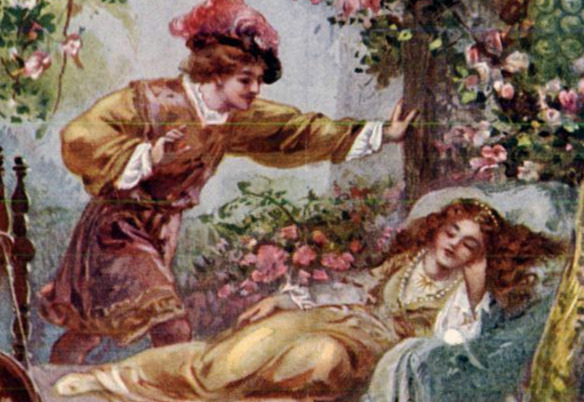Lit Mags
A Hidden World
“Star Witness” by Joe Meno: Episode Six

A Hidden World
Continue reading Episode 7: A Conclusion in the Caves
Previous Episode: Episode 5: The Monster of the Green Lake
1. Shelley looked up and saw a ghostly shape sitting a few feet away on a limestone slab, the form of some hulking man who was upset or lost. It appeared that the person was crying, as several short, muffled exhalations were coming from its direction. Before she backed away, she took in the figure of the specter, its outline — the enormous, sloping shoulders, the outsized, frayed coat, the dime store Halloween mask in the shape of Casper the ghost, and got her breath back. She held the empty shoe in her hand and put the other out toward the gate to steady herself.
The man was Norris Ambley, who often wandered town dressed in different Halloween masks. On some days it was Donald Duck, other days He-man from the eighties cartoon, and during the holidays, a worn and dented version of Santa himself. Each of the masks he wore were thin, molded plastic that barely obscured his wide face. He was well over six-and-a-half feet and had to be several hundred pounds. Shelley had never heard the man speak, only knew him to communicate by claps and whistles.
On the way to work, or even out wandering by the lake, she had seen him appear, startling her for a moment, before vanishing into the woods, cigar box in hand again.
She had watched him at the diner every Saturday, arriving with his elderly uncle who was his caretaker. Though it was hard to tell his age — somewhere in his mid-fifties — whenever he raised one of his masks to eat a double order of chocolate chip pancakes, there was something oddly youthful about his face. She had seen men like him once when her grandmother had gotten her hip replaced. Wandering around on the wrong floor of a rehabilitation hospital in Springfield, she had come across a television room full of the lobotomized and developmentally delayed. This man, Norris, usually had the same peaceful, vacant kind of expression. But tonight it seemed he had been crying.
The man looked up, noticing her.
She raised an unsure hand and when she thought she was safe, took a seat beside the mournful giant.
“Norris, is that you? What are you doing out here alone this late?”
The ghost looked away regretfully.
“Everyone has got some story about you, and your mother and father, and how come you stopped talking. One of them said you found out your mother and father had been killed in a train wreck and you didn’t say another word after that. I guess you were so sad, you didn’t have any use for words.”
The man shuddered and looked down at the cigar box that was sitting in his lap. Shelley had seen him carrying it everywhere with him for as long as she had known him.
“What do you got there?” Shelley asked. “Your treasure?”
The ghost tipped his head forward.
“Everybody’s got all kinds of stories about what’s inside that box. But you never open it in front of anybody, do you?”
The man shook his head. Shelley could feel his eyes moving behind the mask, studying her face.
“I understand. There’s nothing in this world more important than having a secret. Having something small that belongs to you.”
The man seemed to consider this. Several seconds later he held out the box, and gently lifted the paper- and wood-covered lid.
Inside were several black and white photographs, and an odd number of Polaroids — faces and frowns, an entire family history, a town unto itself in faded film and colors.
“Is that Mrs. Cooper, Norris? And this one, is that your father? And Mr. Dart? You got most of the town here. Mrs. Divan and Mrs. Plimpton. You got almost everybody in town in here.”
The man took a picture of his father out of the box and pointed up to the sky. Overhead the clouds had become sparse. Shelley felt her face go flat, tight. “They’re all dead. They’re all dead, aren’t they, Norris? You got a collection of everybody in town who’s dead?”
The ghost dipped its head forward.
“Who else do you have? Mrs. Pauley. And Dwight Sprue. And who’s that?” There was a photograph of a girl, cut from an old newspaper. Shelley read the caption. Abigail Farnum. “Is that Deputy Will’s sister? Look at how pretty she was. Back before I was even born.”
The ghost did not move.
“How come? What’s it all for?” the girl asked.
The man placed his fingers over his heart and then the eyes of the mask.
“To look at?”
The mask shook gently.
“To remember?”
The mask shook its head again.
“To watch over them?”
The mask nodded.
“You’re watching over them, huh? An entire town of your own. I’m glad to know you’re watching over them. It’s beautiful. It really is.”
The mask did not move.
“So how come you’re out here crying?”
The man pointed at the pair of train tracks that ran parallel to the cemetery gates. Behind the mask, Norris offered up an off-key whistle.
“What? The train? The train came by?”
The ghost turned his large palms upwards, signifying his fright.
“And then you got scared?”
The mask nodded solemnly once again.
“How long have you been sitting out here?”
One gesture of the mask tilting forward was enough for her to realize it could have been several hours. “Better get you home,” Shelley said, checking her watch. “It’s past eleven already. Strange things are happening tonight.”
Norris gave a low whistle and stood. The girl saw how enormous, how physically intimidating he was, but the youngster-sized mask and the small cigar box gave her the feeling of being in the presence of a child.
It was then that the man seemed to notice the small white shoe Shelley had been holding. He put his hand out and Shelley, without thinking, gave it to him. “It’s Jamie Fay’s. She was the queen at the Founder’s Day parade last year. You know Jamie, don’t you? She’s missing.”
Norris lifted up the mask and stared down at the shoe seriously, his far-off eyes a shade of blue the girl had never noticed before.
“Did you see her out here tonight, Norris? Do you have any idea where she might be?”
The giant took hold of the shoe and quickly began moving off toward the woods.
“Norris? Norris, where are you going?”
But he was already stalking off and Shelley had no choice but to follow.
2. Before Shelley could take in the height of the failing wire fence, she knew they had come to the Doves’ property. There was the faint smell of sulfur and gasoline, and something much more caustic which she could not place. Though the rumor was the eldest Dove, Raymond, had been known to cook and distribute methamphetamines, she thought it was something closer to burnt hair or clothing.
The giant stood, pointing to a large hole in the rusty wire fence.
“In there? You saw Jamie Fay go through there? When?”
He held up a finger and pointed at his large, open palm.
“Tonight?”
The giant signaled to a part of the fence where the shoe’s mate had been caught. Shelley reached out and touched the second shoe, seeing the initials scrawled along the instep.
“You saw her?”
Norris did not move, but suggested by his absolute stillness that he’d seen the girl.
“Was she alone?”
The man slowly shook his head.
“Was someone after her?”
He did a series of signs with his large hands, which Shelley did not understand. “Did you see her go in there?”
The man pointed seriously.
“Okay, I’ll go. But will you wait for me?”
The giant slowly shook his head. It seemed to Shelley that he was afraid to step any closer to the fence. The girl looked beyond the opening, between the trees and saw three or four trailers, each of which was moldering with rust, sitting uneven on concrete blocks, with power-lines running in knots from one to the other. When she turned back, the giant had gone.
“Okay,” she said to herself. “You can do this. You can do this for Jamie.”
Once she had seen the eldest brother, Raymond Dove, at the diner, having been recently released from jail up in Pontiac, cleaning his teeth with the edge of a serrated pocket knife. Something about the gesture felt vulgar and overwhelming, more prognostication than threat.
“All you have to do is walk through the hole in the fence. You can do that. Just think of Jamie Fay, and wherever she is.”
She put a hand out and began to walk through.
Once upon a time, there was a fox. There was a fox who could play the fiddle, she muttered.
Before she made it ten paces, she heard the dogs. It was what she had smelled, the wet, patchy fur, the tang of their metal collars.
One moment later they were upon her. Shelley could not count them at first, and then did, three, tangled in their chains together like some mythological beast from a book she had once read to Jamie, the two of them hidden beneath a blanket fort they had made. A light went on in one of the trailers, the door jerking open as the girl tried to back away, and fell to her knees.
Mrs. Dove appeared in the weak light in a dirty housedress faded to rags, and a moldy-looking bandage over one eye. There was nothing she reminded Shelley of other than a witch.
“Maggie! Tizzy! Allie! Stop that fucking noise!”
The dogs continued to howl. Mrs. Dove reached over and picked up a hammer and began banging it against a misshapen frying pan.
“I said cut all that fucking noise and get inside the fucking house!” Quickly the dogs obeyed, dragging their chains with them. The old woman unchained each and peered into the dark with her one good eye and said, “Who’s out there?”
Shelley stepped forward, knees dirtied with mud again. “Mrs. Dove?”
“Who’s out there?”
“Shelley. Shelley George. From the diner. We used to see you at church. I was in school with your youngest.”
“I don’t care who you are. Don’t you know whose property you’re on? What are you doing in my woods in the middle of the night?”
“I came because…I’m looking…I heard Jamie Fay might be out here. She’s missing. Her parents, the Sheriff, everyone’s looking for her.”
“That ain’t got nothing to do with me. I ain’t seen that girl. You got no business on this property.”
“Yes, ma’am, I know. But are you sure she’s not out here?”
“I told you. That’s none of my business. Now you clear out before I call out those dogs again.”
Pleading, Shelley said, “Please, Mrs. Dove, I’ve…I’ve looked everywhere. Someone told me thought she was out here. Are you sure you haven’t seen her?”
“Are you going to go, or do I have to call Raymond to carry you off?”
Shelley began to cry a little, shaking her head, but still she did not move. The shadow in the door disappeared, and ten seconds later another shadow appeared, angular, wiry, mean.
In a second, she could see Raymond Dove, the eldest, in a sleeveless white t-shirt spotted with oil and blood. There was his wide face and misshapen left arm, smaller than the other, cradled across his chest as if in a sling.
Before she knew it, he had gotten his one hand under her armpit, had his greasy hand over her mouth and was shoving her back toward the fence. The door to the trailer closed with a bang and all light went with it.
Because she could not scream, because she knew she would not be heard, she began to bite and fuss, but the man kept shoving her further into the woods.
She fell once but got dragged her to her feet, once more, the man covering her mouth.
“Be quiet now. Go on. Hush up. I’m going to show you something.”
“No. Please,” she was able to mutter.
“Just be quiet and I’ll show you.”
She pushed his hand away and the man spoke, his t-shirt appearing translucent in the dark, revealing the jailhouse tattoos beneath: “Do you want to find that girl or not?”
He pointed, and once again Shelley saw a loop of pink and white string hanging from a tree, a God’s eye momentarily divisible from the branches.
3. Beneath the underpass that crossed the highway one half mile from the Doves’ property, there was a small moth-eaten mattress full of beige and black holes, surrounded by stuffed animals, children’s drawings, and other pieces of broken furniture, all of it pink and white and red.
Shelley stood, disbelieving.
“That girl. The one that’s gone missing,” Raymond Dove began. “She dragged all this stuff down from those old piles at the back of our place. I watched her do it. She dragged that mattress all the way from the dump across the highway by herself. Almost got herself killed but she did it. Worked on it all summer.”
Shelley began to look around, inspecting the wet stuffed animals, the dolls missing limbs, the almost invisible, secret world Jamie Fay built for herself. Shelley leaned over and found a drawing of a forest of intersecting pink and white lines hung up on a strand of pink yarn.
It was like stepping right into a twelve-year-old girl’s feelings and mind, the colors, fragments, the collision of fairytale pictures, aged paperback novels, and cut-out photos of teen idols from worn celebrity magazines.
“She made all this? It’s perfect. A perfect world. A perfect, secret world of her own.”
The man cleared his throat and said, “I come down here sometimes. When she’s not around. It’s pretty. I like to pretend that I’m a kid again. I pretend to be someone different, like I can start over, like I’m that girl, with a whole future ahead of me.”
She nodded, kneeling down, paging through a sketchbook of drawings, most of which were pink maps of castles and magic forests. Beneath the sketchbook was a small pink music box, which had been locked. Shelley tried to force it open, but was unable. Then she remembered the key. Digging into her pocket, she found the small silver key and slipped it inside the opening. The music box quickly sprung to life, playing a toy piano version of “Claire de Lune.” The girl smiled, finding a gold necklace on top of a pile of small, folded notes.
“What did you find?” the man asked.
“It’s a necklace. It’s got a locket on it of some kind. It’s pretty.”
“It looks old.”
The girl tried a few times to unclasp it but the locket had rusted closed.
Without a word, the man handed her his pocket knife. Carefully, Shelley opened the serrated blade and slipped the edge into the clasp. The locket sprung open. She turned and handed the knife back to Raymond Dove.
“Look here. It says Abigail. Why would Jamie have that?”
She lifted one of the notes out of the music box and began to page through them.
“What are those?” Raymond Dove asked.
“Look like love notes. From some boy. I don’t know who. It’s just an initial. Somebody named W.”
Shelley unfolded one of the notes and began to read:
You are as bright as a rainbow. I see everything through your eyes and everything seems good. You’re also a true friend and good listener.
She opened another and read:
Don’t let anyone ever tell you what you can and can’t do.
Everything good is eternal and unchanging, your name and age, everything about you.
She folded up the note and searched through the box again, and found, at the bottom, a golden pin. “What’s that?” Raymond Dove asked.
Shelley turned the pin over in the half-light from the highway and saw it for what it was. A pin, in the shape of a star, with a circle in the middle. Jus. Fidus. Libertatum.
“Oh my God. I know who it’s from,” she said.
Continue reading Episode 7, the finale: A Conclusion in the Caves








